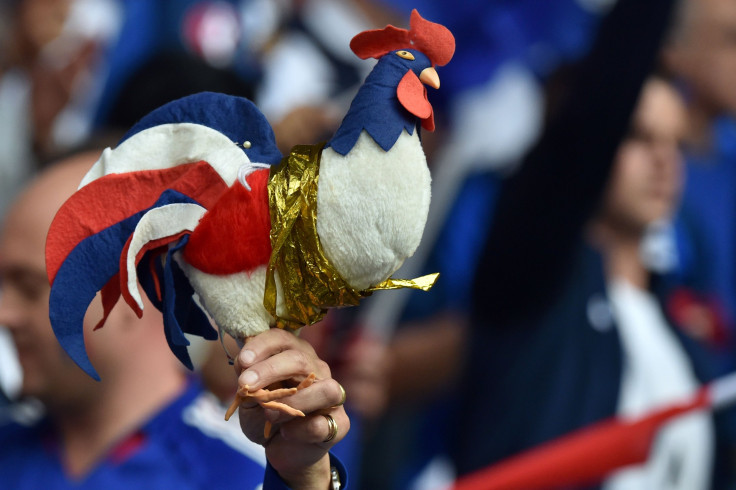Why Do French Players' Jerseys Have Roosters On Them At Euro 2016 Germany-France Game?

All eyes were on France and Germany Thursday as soccer teams from the two countries faced off in the Euro 2016 semifinals. And as some fans admired the athletes' moves, others found themselves wondering about their outfits — specifically, why there's a rooster on the French players' jerseys.
Here's your explanation: It's technically a Gallic rooster, or in French "le coq gaulois," and it's a national symbol of sorts.
France's soccer players have worn jerseys with the bird since 1909, according to goal.com, but the tradition predates that. The embassy of France in the U.S. notes on its website that people of the 1800s rallied around the rooster because of a pun. In Latin, "gallus" means Gaul, a land area that includes France, and also "gallus," meaning rooster.
Napoleon tried to replace the rooster when he came into power, but by 1899 even coins and metal gates had the rooster on it, according to the official website for the French government. "The rooster became the symbol of a France sprung from peasant origins, proud, opinionated, courageous and prolific, " it explains. "While the rooster is not an official symbol of the Republic, it still stands for a certain idea of France. In the collective imagination, particularly in the area of sports, it remains the best illustration of the Nation."
That's not to say the rooster hasn't encountered issues. Just a few weeks ago, Euro 16 organizers told football fan Clement Tomaszewski his cockerel Balthazar couldn't attend the upcoming tournament. Balthazar had been going to games for about 20 years, according to BBC News.
"My cock's part of the French football legend and yet I can't bring him to a game," Tomaszewski told the news outlet.
Nevertheless, Balthazar had predicted France would win Thursday's matchup. Watch the dramatic video of Balthazar's choice here.
Clément d’#Antibes et Balthazar le coq pronostiquent la victoire des #Bleus demain #FRAALL #FRA #Euro2016 pic.twitter.com/E0KghOGYFD
— Rfm Provence redac (@rfm_redac) July 6, 2016
© Copyright IBTimes 2025. All rights reserved.






















